| Release List | Reviews | Price Search | Shop | Newsletter | Forum | DVD Giveaways | Blu-Ray/ HD DVD | Advertise |
| Reviews & Columns |
|
Reviews DVD TV on DVD Blu-ray International DVDs Theatrical Reviews by Studio Video Games Features Collector Series DVDs Easter Egg Database Interviews DVD Talk TV DVD Talk Radio Feature Articles Columns Anime Talk DVD Savant HD Talk Horror DVDs Silent DVD
|
DVD Talk Forum |
|
|
| Resources |
|
DVD Price Search Customer Service #'s RCE Info Links |
|
Columns
|
 |
Robert Mitchum |
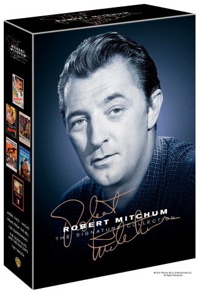
|
Warner DVD Angel Face, Macao, Home from the Hill, The Sundowners, The Good Guys and the Bad Guys, The Yakuza Starring Robert Mitchum Street Date January 23, 2007 59.98 the boxed set Reviewed by Glenn Erickson |
Few classic movie stars are as consistently enjoyable than Robert Mitchum. Going down a list of his credits, the entertaining shows outnumber the losers by 4 to 1, and even the losers can be pleasant just to see the man with the big shoulders slouch nonchalantly through his paces. Humphrey Bogart may have become hip in retrospect but Mitchum was a hepcat from the get-go. His most characteristic line of dialogue may have been a variation on, "Baby, I don't care" 1 but from the evidence of his films, it's clear that Mitchum did care.
Warners' Robert Mitchum The Signature Collection will be a mixed bag to non- Mitchumphiles and paydirt to his fans. With two RKOs, one MGM and three Warners titles (a Royal Flush) we get to see Robert age gracefully from an early-1950s hunk to a middle 1970s hunk with some serious mileage. The films have variety and a number of great co-stars, from Jean Simmons and Jane Russell to Eleanor Parker, Deborah Kerr and Keiko Kishi.
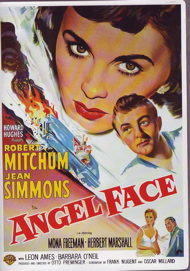
Angel Face
1952 / B&W / 1:37 flat full frame / 91 min.
Starring Robert Mitchum, Jean Simmons, Mona Freeman, Herbert Marshall, Leon Ames, Barbara O'Neil, Kenneth Tobey
Cinematography Harry Stradling
Art Direction Carroll Clark, Albert S. D'Agostino
Film Editor Frederic Knudtson
Original Music Dimitri Tiomkin
Written by Chester Erskine, Oscar Millard, Frank Nugent
Produced and Directed by Otto Preminger
Angel Face is reviewed separately at This URL.
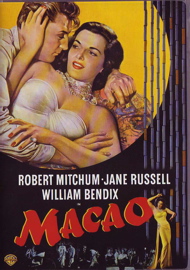
Macao
1952 / 81 min.
Starring Robert Mitchum, Jane Russell, William Bendix, Thomas Gomez, Gloria Grahame, Brad Dexter, Vladimir Sokoloff
Cinematography Harry J. Wild
Art Direction Ralph Berger, Albert S. D'Agostino
Film Editor Samuel E. Beetley, Robert Golden
Original Music Anthony Collins
Written by Stanley Rubin, Bernard C. Schoenfeld, Bob Williams
Produced by Samuel Bischoff, Alex Gottlieb
Directed by Josef von Sternberg
Macao isn't much of a movie, noir or otherwise, and unlike other films completely futzed by Howard Hughes, there's not much here to recommend beyond the personal charm of its stars. The story is a non-starting snooze and the pre-hip hepcat dialogue is short on wit. As it turns out, the work of credited director Josef von Sternberg was reduced to a minimum when the manic Hughes had most of the movie re-shot by whatever contract director was available, mostly Nicholas Ray. The chemistry between Mitchum and Jane Russell makes the show worth a visit, but believe me, you've seen it all before.
Macao klunks along with the right ingredients for intrigue -- an exotic locale, beautiful women, laconic chain-smoking heroes with bedroom eyes -- but doesn't really deliver. The heavy hand of Howard Hughes manages a completely anonymous look by combining the effort of several directors, who often didn't know how the scene they were shooting connected with the film around it. Or at least that's what two biographers of directing substitute Nicholas Ray have to say; Robert Stevenson apparently contributed as well. The cast hated the fussy and imperious Josef von Sternberg, the thirties' stylist who would seem the last director on Earth that Howard Hughes would add to his stable. Except for a curiously unexciting chase scene through a maze of picturesque fishing nets (and perhaps a few details in the casino scenes), the presence of von Sternberg is nigh undetectable.
The movie might as well have been directed by Jimmy Generic ... scenes flop on screen without emphasis and the occasional bad continuity is distracting. A couple of reels play out in front of rear projection as the stars sort out their iffy romance in a rickshaw or a sampan tour of the harbor.
Everyone but Thomas Gomez' embarrassing Portuguese cop gets an okay shake. Gloria Grahame is cute but essentially wasted as a moll with a soft heart for Mitchum and William Bendix's character doesn't fool anyone. Brad Dexter is suitably oily, but the script doesn't sufficiently explain why he suddenly chooses to wander into police jurisdiction, self-destructing without much help from our hero. Vladimir Sokoloff is a laughably inane blind Chinese beggar, the kind that helps out kindly Americans on the street.
A timely note: When first explaining his globe trotting ways, Robert MItchum's Nick Cochran character explains that before he hit Hong Kong, he was smuggling guns into Iraq. Tell us, Howard, were you helping the C.I.A. with their middle-Eastern adventures around this time?
The disc of Macao looks fine, even if the audio is a bit boomy. Jane Russell's torch songs are good, especially the Arlen-Mercer number with the famous lyric "That's one for my baby and one for the road."
The commentary track is a special treat. Eddie Muller abandons a detailed analysis of the movie to host a gab session with screenwriter Stanley Rubin, who tells some pretty amazing stories about life as a screenwriter and producer. Rubin used Macao to jump to producing on The Narrow Margin and was soon at Fox doing River of No Return with Mitchum and Marilyn Monroe. He talks about his dating efforts with Janet Leigh, Gloria Grahame and finally Kathleen Hughes, who he eventually married. We hear some good insider studio talk about Hughes and work at RKO, but no stories whatsoever about how (or why) Macao was changed during all the rewrites and re-shoots. Five uncredited scribes are listed in the IMDB; I'm thinking of sending my name in. Muller knows how much each actor was paid but doesn't go into which directors filmed what. Rubin, incidentally, also tells his version of the making of the mysterious William Cameron Menzies film The Whip Hand.
Rubin sounds like an extremely nice guy. Instead of building his ego with hero stories he comes right out and admits that he became a producer because he liked the work of other writers better than his own.
Muller is as charming as ever, and it's a blessing to know that he mispronounces 'chiaroscuro' the same way I do when I forget my college Italian. Edited into the commentary is Jane Russell, who adds some pleasant memories, at one point describing a metallic dress she wears for one scene. Russell didn't care for Sternberg, either.
Of special note is a TCM Private Screenings episode with Robert Osborne interviewing Mitchum and Russell. It's a very enjoyable and informative sit-down. When Mitchum tells a 'this is how it was' story, we tend to believe him.
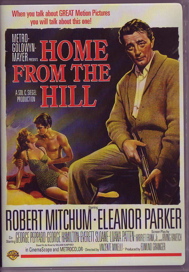
Home from the Hill
1960 / 2:35 anamorphic widescreen / 150 min.
Starring Robert Mitchum, Eleanor Parker, George Peppard, George Hamilton, Everett Sloane, Luana Patten
Cinematography Milton Krasner
Art Direction Preston Ames, George W. Davis
Film Editor Harold F. Kress
Original Music Bronislau Kaper
Written by Harriet Frank Jr., Irving Ravetch from a novel by William Humphrey
Produced by Edmund Grainger, Sol C. Siegel
Directed by Vincente Minnelli
Judging by Vincente Minnelli's filmic output one would think that the collapse of MGM in the 1950s had never happened. He kept turning out expensive color and CinemaScope films into the middle sixties, among them giant hits like 1958's Gigi, an Oscar winner for Best Picture. Minnelli may have officially launched the Rat Pack by teaming Frank Sinatra and Dean Martin in Some Came Running and for this rather overheated super soap opera he turned to Robert Mitchum. Just two years before, Old Sleepy Eyes had played a trim Marine for John Huston in Heaven Knows, Mr. Allison but he's just starting to seriously show his age in Home from the Hill.
That's when Theron discovers that his father's young tenant Rafe Copley (George Peppard) is really his illegitimate and unacknowledged son. Wade rejects Theron's protests so the boy moves out, breaking his mother's heart. But when Libby turns up with a problem pregnancy, town gossip and runaway emotions get out of hand.
Auteur critics embraced Vincente Minnelli's lush MGM dramas and praised his use of the CinemaScope screen and his literally color-coded themes. The dramatics in his shows lacked subtlety, whether it was Kirk Douglas grimacing in a mirror in Lust for Life or everyone's favorite Bad Psychological Play, The Cobweb. Part of the Curse of MGM was shooting 50s and 60s movies with the studio's 40s technology, and a potentially good picture like Brigadoon played out against some of the biggest, least attractive cycloramic sets ever painted. A big chunk of Home from the Hill was filmed on location but Minnelli manages to make the outdoors look like an over-art directed interior set; one can imagine his corp of set dressers worrying over the texture and tint of every blade of studio-manufactured swamp shrubbery. Minnelli would later go to CineCittá to shoot Two Weeks in Another Town, turning Rome into an extension of the Culver City back lot.
Director Douglas Sirk found a way of making his artificial soapsuds dramas seem heartfelt. Minnelli certainly has control of his visuals but frequently allows his cast to overact. Robert Mitchum takes everything in stride yet seems too reasonable a guy to be so bullheaded about his habits, or so callous in his treatment of other people. The character is believable but Mitchum's persona gets in the way. On the other hand, we see no reason why such a brute wouldn't have dragged his unhappy wife to bed whether she wanted to go or not -- he certainly has no inhibitions about persecuting Rafe or bullying Theron. Wade proudly tells us that some of the stuffed animal heads on his wall put up tough fights before they died, and we want to laugh at his idea of fair odds.
Eleanor Parker is an accomplished hand at playing desirable women that win difficult men through courage and resolve, as witness her excellent work in Byron Haskin's The Naked Jungle. But the script mostly leaves her Hannah out in the cold, to become overly hysterical when her 'baby' boy is taken away. When she defies Wade by refusing his advances, she comes off as a frigid bore.
Minnelli concentrates instead on the male relationships. Wade has a personal posse of tenant farmers (Dub Taylor, Guinn 'Big Boy' Williams) that act like yokels and inadvertently spread rumors of his sexual exploits to the wrong ears. They're not particularly interesting or even convincing. The film has two 'new star' discoveries. What anybody saw in George Hamilton is difficult to fathom, as he really can't act; even Jim Hutton might have been better in the role, and Anthony Perkins would have been terrific. Home from the Hill's real find is George Peppard, who as the bastard son Rafe steals the movie outright. Peppard's natural hayseed is also a decent guy, and the script prepares us well for scenes that resolve his deep need to be acknowledged by his rotten father. Luana Patten's local cutie shares some moments with him in a supermarket and a coffee shop that almost dissolve the barrier of MGM gloss; Rafe and Hannah's problems seem more pressing than the marital split between Wade and Hannah. In fact, when Mitchum's great hunter finally 'comes home from the hill' for a last-minute reconciliation, all we can ask is why it didn't happen nineteen years and fifty-one weeks earlier.
Minnelli does wrap up Home from the Hill with a throat-tightening final scene that always wins audience approval, even though we have to wonder what got in Rafe's brain to invite his step-mother-in-law to move in with him. An un-filmed sequel could have been called Over the Hill; in it Libby would get fed up with Hannah butting into her home life and leave town with the baby. For that matter, how did Libby ever put up with Rafe's stinking hounds, the ones that come running when he clicks his fingers? Rafe may be a saint, but more than likely he'll try the same finger-snapping obedience trick on Libby, soon enough.
Constance Ford plays one of Wade's good-time girls. Everett Sloane has an intense but thankless part as Libby's resentful father. I was rather hoping that he and Hannah would surprise the pompous Wade by revealing that they'd been carrying on a decade-long affair. Home from the Hill resolves its central conflict in old-fashioned Hollywood potboiler style ... with an All-American ambush gun-down.
Warners' DVD of Home from the Hill presents this entertaining drama in a beautiful enhanced widescreen transfer; no more flipping sides twice on the old blurry Laserdisc (and in 1991 we thought they looked so much better than VHS!). The audio is clear, giving us an earful of Bronislau Kaper's title tune, which sounds almost exactly like the opening bars of the Tammy song. A trailer is included.
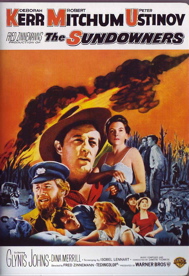
The Sundowners
Warner DVD
1960 / Color / 1:78 anamorphic 16:9 / 133 min.
Starring Deborah Kerr, Robert Mitchum, Peter Ustinov, Glynis Johns, Dina Merrill, Chips Rafferty, Michael Anderson Jr., Lola Brooks
Cinematography Jack Hildyard
Art Direction Michael Stringer
Film Editor Jack Harris
Original Music Dimitri Tiomkin
Written by Isobel Lennart from the novel by Jon Cleary
Produced by Gerry Blatner
Directed by Fred Zinnemann
The Sundowners is reviewed separately at This URL.

The Good Guys and the Bad Guys
1969 / 2:35 enhanced widescreen /91 min.
Starring Robert Mitchum, George Kennedy, Martin Balsam, David Carradine, Tina Louise, Douglas Fowley, Lois Nettleton, John Davis Chandler, John Carradine, Marie Windsor, Dick Peabody, Kathleen Freeman, Nick Dennis
Cinematography Harry Stradling Jr.
Production Design Stan Jolley
Film Editor Howard Deane
Original Music William Lava
Written by Ronald M. Cohen, Dennis Shryack
Produced by Ronald M. Cohen, Robert Goldstein, Dennis Shryack
Directed by Burt Kennedy
This is the weakest film in the collection and a good example of the kind of Western made extinct by Sam Peckinpah's The Wild Bunch, which came out in the same year. Burt Kennedy was a stronger writer than a director (especially when writing for Budd Boetticher) and The Good Guys and the Bad Guys plays like a watered-down version of Ride the High Country, which Kennedy had remade in spirit in his Mail Order Bride. Jokey and slack in an inconsequential way, the film goes for weak slapstick humor. What's good about it? For relaxing with a beer and some outdoor scenery, Robert Mitchum is perfect company.
The Good Guys and the Bad Guys has a number of good aspects, but lacks wit, a sense of urgency and a general point to make. Glenn Yarbrough warbles The Ballad of Marshal Flagg over traveling scenes but doesn't conjure the magic of the classic Gunfight at the O.K. Corral. Those lyrics are awfully trite.
The comedy in town is pitched halfway to the level of Blazing Saddles. Martin Balsam's corrupt and 'Randy' mayor gets caught with his pants down with married lady Tina Louise ...why couldn't they go all the way and put Jim Backus or Russell Johnson in the role, with Bob Denver as his sidekick?
The movie has very pretty scenery, especially during the train robbery scenes. We also enjoy seeing genre stalwarts like Douglas Fowley, John Davis Chandler, Marie Windsor, Nick Dennis and Kathleen Freeman making brief appearances. David's father John Carradine is a cranky train conductor. Robert Mitchum and George Kennedy make an amiable drinking pair but our patience runs thin when they're saddled with a worthy widow (Lois Nettleton) and her freckle faced, well-mannered son ... we're almost ready to meet the Brady Bunch.
The DVD of The Good Guys and the Bad Guys looks fine and spotless in its enhanced transfer. A featurette of behind the scenes footage is included, as well as a trailer.
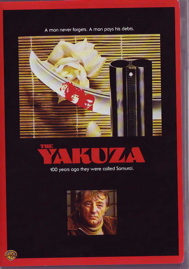
The Yakuza
1974 / 2:35 enhanced widescreen / 112 123 min.
Starring Robert Mitchum, Takakura Ken, Brian Keith, Eiji Okada, Richard Jordan, Keiko Kishi, James Shigeta
Cinematography Duke Callaghan, Kozo Okazaki
Production Design Stephen Grimes
Art Direction Yoshiyuki Ishida
Film Editor Don Guidice, Thomas Stanford
Original Music Dave Grusin
Written by Leonard Schrader, Paul Schrader, Robert Towne
Produced by Michael Hamilburg, Sydney Pollack, Koji Shundo
Directed by Sydney Pollack
Nobody seemed to like The Yakuza when it was new; Savant saw it two years later and thought it terrific, one of the best of Paul Schrader's unofficial remakes of The Searchers. In the context of the Japanese Yakuza genre, then known in the States to only a few foreign film aficionados, we see the familiar tale of old warriors upholding perverse codes of behavior, only to doom the next generation. A genre hybrid of morose heroes and sudden violence, Schrader's film beautifully establishes the presence of an American-style gangster in a millieu of Ginza Pachinko parlors. Some new DVD reviews I've read call The Yakuza pretentious and obsolete, but I think they're reacting to the dated mid-70s fashions ... this is a multigenerational soap opera of great power, with intense characterizations much too rich to spoil here.
The Yakuza tries to do a lot, starting with introducing a heavily ritualized Japanese genre to the American public. Film Comment magazine explained at the time that the standard Yakuza film followed a rigid structure, with a specific number of scenes in the same order. Some of the cultural mismatches include funny stuff like a cabaret singer trying his hand at My Dawlin' Crementine but Richard Jordan is impressed by Japan's psychological inversions of American ideas -- the ascetic Tanaka Ken is helping Kilmer out of a Zen-like devotion to an abstract concept called Giri, a responsibility described as 'the burden hardest to bear.' Ken's Giri turns out to be a jaw-dropping revelation that turns everyone's life upside down.
The violence is frequent and makes a terrific impact. Along on the kidnap recovery just for backup, Ken must use a sword, thereby running afoul of the Yakuza code and making himself a target for bounty hunters and assassins. Kilmer goes to Ken's brother Goro (James Shigeta) for help, and learns only that Ken now needs Kilmer's help, even though he's unlikely to accept it.
Anybody expecting formulaic swordplay will be dazzled by a messy fight with knives and guns in the apartment of college professor Oliver Wheat (Herbert Edelman); English critics at the time loved the fact that Ken briefly uses a bicycle as a defensive weapon against a katana sword. At the end, Kilmer unleashes his .45 and a shotgun to help Ken assault a pavilion loaded with Yakuza gamblers, culminating in an outrageous, tense sword fight.
The Yakuza central premise betters Sam Fuller's rather nonsensical House of Bamboo; these American gangsters in Japan are credible because they started as black marketeers raiding U.S. Army stores -- rather like Harry Lime in The Third Man but minus the deadly penicillin. Harry became an expert on the local crime scene but even he had to call it quits. Now, twenty years later, he returns to discover a terrible secret about the love of his life.
I've read reviews unimpressed by the scenes centered on the Yakuza ritual of cutting off one's little finger to atone to a superior that one has disappointed, or to show sincerity for a friend one has wronged. I find this part of the movie moving and profound. It's not too many action pictures that embody a code of personal responsibility and The Yakuza ends on a melancholy but extremely satisfying note. This is very highly recommended for viewers looking for something different and exotic.
The Yakuza looks great in this sharp and colorful transfer, replacing a bleary old laserdisc. Director Sidney Pollack practically apologizes for the film in his commentary, probably because it was an expensive flop and he's had thirty years to savor more prestigious pictures that put a better polish on his career. Pooh to that. A making-of featurette from 1974 takes an odd point of view and manages to make the movie seem dull. Older sources say that the show was a reel longer in its Japanese release and I'm sorry that the DVD release didn't restore the footage -- this reviewer would welcome more of The Yakuza any time, anywhere.
On a scale of Excellent, Good, Fair, and Poor,
|
Angel Face rates:
Movie: Excellent Video:: Excellent Sound:: Excellent Supplements: Commentary by Eddie Muller |
Macao rates:
Movie: Good -- Video:: Excellent Sound: Good Supplements: Commentary by Eddie Muller, screenwriter Stanley Rubin and actress Jane Russell; TCM Private Screenings with Robert Mitchum and Jane Russell, hosted by Robert Osborne |
|
Home from the Hill rates:
Movie Good Video:: Excellent Sound:: Excellent Supplements: Trailer |
The Sundowners rates:
Movie: Excellent Video:: Excellent Sound:: Excellent Supplements: Featurette On Location with The Sundowners, Trailer |
|
The Good Guys and the Bad Guys rates:
Movie: Good -- Video: Excellent Sound: Supplements: Featurette The Good Guy from Chama, Trailer |
The Yakuza rates:
Movie: Excellent Video:: Excellent Sound:: Excellent Supplements: Commentary by Sydney Pollack; featurette Promises to Keep |
Packaging:
Reviewed: January 20, 2007
Footnotes:
1. Out of the Past, 1947.
Return
2. Gary Teetzel offers a link to this odd French stop-motion animation Robert Mitchum film to add to the star-worshipping fun.
Return
Review Staff | About DVD Talk | Newsletter Subscribe | Join DVD Talk Forum
Copyright © MH Sub I, LLC dba Internet Brands. | Privacy Policy | Terms of Use
|
| Release List | Reviews | Price Search | Shop | SUBSCRIBE | Forum | DVD Giveaways | Blu-Ray/ HD DVD | Advertise |





